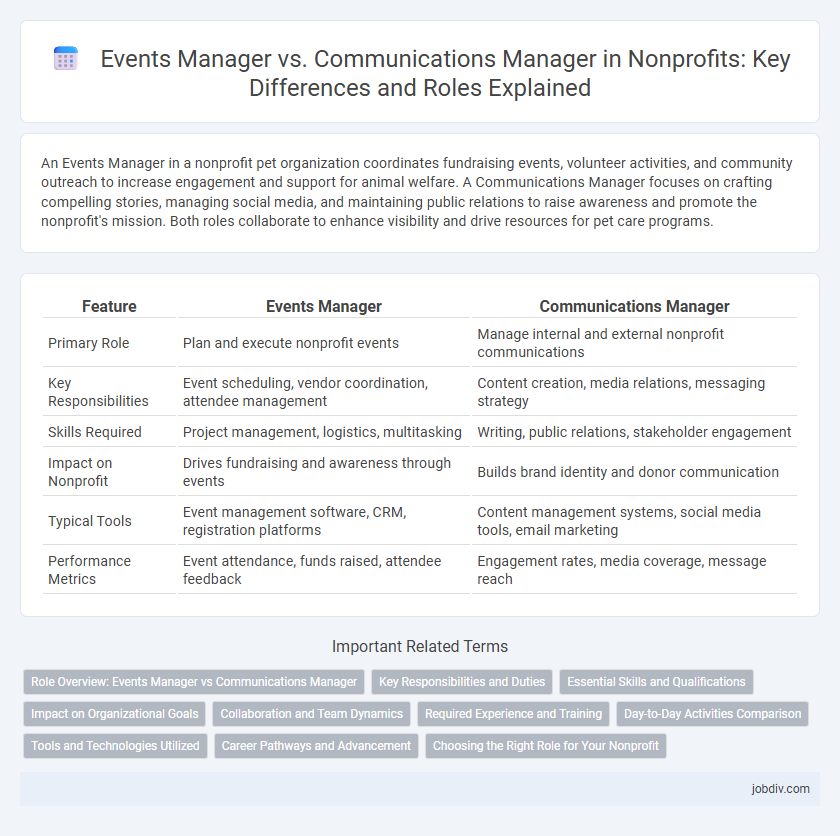An Events Manager in a nonprofit pet organization coordinates fundraising events, volunteer activities, and community outreach to increase engagement and support for animal welfare. A Communications Manager focuses on crafting compelling stories, managing social media, and maintaining public relations to raise awareness and promote the nonprofit's mission. Both roles collaborate to enhance visibility and drive resources for pet care programs.
Table of Comparison
| Feature | Events Manager | Communications Manager |
|---|---|---|
| Primary Role | Plan and execute nonprofit events | Manage internal and external nonprofit communications |
| Key Responsibilities | Event scheduling, vendor coordination, attendee management | Content creation, media relations, messaging strategy |
| Skills Required | Project management, logistics, multitasking | Writing, public relations, stakeholder engagement |
| Impact on Nonprofit | Drives fundraising and awareness through events | Builds brand identity and donor communication |
| Typical Tools | Event management software, CRM, registration platforms | Content management systems, social media tools, email marketing |
| Performance Metrics | Event attendance, funds raised, attendee feedback | Engagement rates, media coverage, message reach |
Role Overview: Events Manager vs Communications Manager
An Events Manager in a nonprofit organization focuses on planning, coordinating, and executing fundraising and awareness events that engage donors and community members to support the mission. A Communications Manager oversees the development and implementation of strategic communication plans, managing media relations, digital content, and public messaging to enhance the organization's brand and stakeholder engagement. Both roles require strong organizational skills and collaboration but differ in their core focus: Events Managers prioritize event logistics and participant experience, while Communications Managers drive narrative and outreach efforts.
Key Responsibilities and Duties
Events Managers in nonprofits coordinate logistics, venue selection, vendor management, and volunteer coordination to execute fundraising events and community engagement activities. Communications Managers develop and implement strategic messaging, manage media relations, create content for digital platforms, and oversee brand consistency to enhance public awareness and stakeholder engagement. Both roles require collaboration with cross-functional teams but emphasize event execution versus message dissemination.
Essential Skills and Qualifications
An Events Manager in a nonprofit must excel in project management, budgeting, and vendor coordination to successfully organize fundraising events and community outreach programs. Essential skills include strong logistical planning, attention to detail, and the ability to manage teams under tight deadlines. A Communications Manager requires expertise in strategic messaging, content creation, media relations, and digital communication tools to effectively promote the nonprofit's mission and engage stakeholders.
Impact on Organizational Goals
An Events Manager directly drives fundraising and community engagement through strategic event planning, generating revenue and raising awareness for nonprofit causes. In contrast, a Communications Manager amplifies the organization's message, enhancing brand reputation and donor relationships via targeted campaigns and media outreach. Both roles synergistically impact organizational goals by increasing visibility, support, and resources essential for mission fulfillment.
Collaboration and Team Dynamics
An Events Manager and Communications Manager in nonprofit organizations collaborate closely to enhance outreach and engagement, blending project coordination with strategic messaging. Their teamwork drives seamless execution of fundraising events, volunteer mobilization, and public awareness campaigns by aligning communication strategies with event logistics. Strong interdepartmental communication fosters a unified brand voice and maximizes donor and community impact.
Required Experience and Training
An Events Manager in the nonprofit sector typically requires experience in event planning, logistics coordination, and vendor management, often supported by a background in hospitality or project management. A Communications Manager needs expertise in public relations, media strategy, and digital content creation, usually with formal training in communications, marketing, or journalism. Both roles benefit from internships or volunteer work in nonprofit organizations to build relevant skills and industry knowledge.
Day-to-Day Activities Comparison
Events Managers in nonprofits primarily coordinate logistics, venue booking, and vendor relations to ensure smooth event execution, while Communications Managers focus on content creation, media outreach, and internal messaging to enhance organizational visibility. Events Managers handle attendee registration, volunteer coordination, and onsite troubleshooting, whereas Communications Managers manage social media channels, press releases, and stakeholder communications. Both roles require collaboration with marketing teams and leadership to align events and messaging with nonprofit goals.
Tools and Technologies Utilized
Events Managers leverage project management software such as Asana or Trello to coordinate logistics, alongside event-specific tools like Eventbrite and CVENT for registration and attendee management. Communications Managers utilize platforms like Hootsuite, Mailchimp, and Canva to craft, schedule, and analyze digital campaigns, ensuring consistent messaging across social media and email channels. Both roles increasingly incorporate CRM systems such as Salesforce or DonorPerfect to integrate donor data and streamline stakeholder engagement.
Career Pathways and Advancement
Events Managers in nonprofits specialize in planning and executing fundraising and community engagement activities, often progressing to senior roles in program management or development. Communications Managers focus on crafting organizational messaging, media relations, and strategic outreach, advancing toward positions like director of communications or public affairs. Both career pathways offer opportunities for leadership growth, with Events Managers leveraging project coordination skills, while Communications Managers capitalize on strategic communication expertise.
Choosing the Right Role for Your Nonprofit
An Events Manager in a nonprofit organization specializes in planning, coordinating, and executing fundraising events and community outreach activities to boost donor engagement and brand visibility. A Communications Manager focuses on crafting strategic messaging, managing public relations, and overseeing digital content to enhance the nonprofit's reputation and stakeholder relationships. Choosing the right role depends on whether your nonprofit needs to prioritize hands-on event management or strategic communication leadership to achieve its mission goals.
Events Manager vs Communications Manager Infographic

 jobdiv.com
jobdiv.com